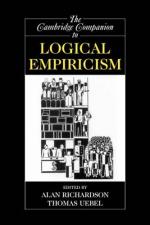|
This section contains 5,515 words (approx. 19 pages at 300 words per page) |

|
"Logical positivism" is the name given in 1931 by A. E. Blumberg and Herbert Feigl to a set of philosophical ideas put forward by the Vienna circle. Synonymous expressions include "consistent empiricism," "logical empiricism," "scientific empiricism," and "logical neopositivism." The name logical positivism is often, but misleadingly, used more broadly to include the "analytical" or "ordinary language" philosophies developed at Cambridge and Oxford.
Historical Background
The logical positivists thought of themselves as continuing a nineteenth-century Viennese empirical tradition, closely linked with British empiricism and culminating in the antimetaphysical, scientifically oriented teachings of Ernst Mach. In 1907 the mathematician Hans Hahn, the economist Otto Neurath, and the physicist Philipp Frank, all of whom were later to be prominent members of the Vienna circle, came together as an informal group to discuss the philosophy of science. They hoped to give an account of science that would do justice—as, they...
|
This section contains 5,515 words (approx. 19 pages at 300 words per page) |

|


